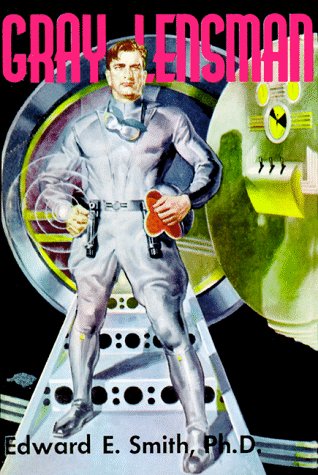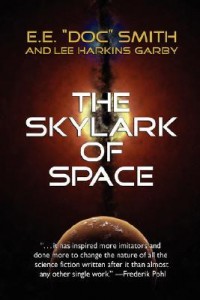Republished by Blog Post Promoter
 Since I received and published the interview transcripts from the late Nurse Matilda MacElroy, which I published in the non-fiction book Alien Interview, I have become a great fan of E. E. “Doc” Smith, (May 2, 1890 – August 31, 1965) an American science fiction author, best known for the Lensman and Skylark series. He is sometimes called the father of “space opera“.
Since I received and published the interview transcripts from the late Nurse Matilda MacElroy, which I published in the non-fiction book Alien Interview, I have become a great fan of E. E. “Doc” Smith, (May 2, 1890 – August 31, 1965) an American science fiction author, best known for the Lensman and Skylark series. He is sometimes called the father of “space opera“.
After reading these two series of books, and a few others by the same writer, I can understand why Doc Smith was an influence of the iconic writers and film makers such as George Lucas, who reveals in his biography, that the Lensman novels were a major influence on his youth. And, J. Michael Straczynski, creator of the science fiction television series Babylon 5, also has acknowledged the influence of the Lensman books. Sir Arthur C. Clarke‘s space battle in Earthlight was based on the attack on the Mardonalian fortress in chapter seven of Skylark Three. Superman-creator Jerry Siegel was impressed, at an early age, with the optimistic vision of the future presented in Skylark of Space. Ron Howard‘s Imagine Entertainment and Universal Studios are in negotiation with the Smith estate for an 18-month film rights option on the series.
In order to gain a greater understanding of his books, and the amazing science and philosophical points of view revealed by “The Master”, Doc Smith, I thought it would be a good idea to read some of the books that influenced “The Master”. Read the works of “The Master”, but also read what “The Master” has read.
In his 1947 essay “The Epic of Space”, E.E. “Doc” Smith listed (by last name only) authors he enjoyed reading:

John W. Campbell, L. Sprague de Camp, Robert A. Heinlein, Murray Leinster, H. P. Lovecraft, A. Merritt (specifically The Ship of Ishtar, The Moon Pool, The Snake Mother, and Dwellers in the Mirage, as well as the character John Kenton), C.L. Moore (specifically Jirel of Joiry), Roman Frederick Starzl, John Taine, A.E. van Vogt, Stanley G. Weinbaum (specifically Tweerl), and Jack Williamson. In a passage on his preparation for writing the Lensman novels, he notes that Clinton Constantinescu’s “War of the Universe” was not a masterpiece, but says that Starzl and Williamson were masters; this suggests that Starzl’s Interplanetary Flying Patrol may have been an influence on Smith’s Triplanetary Patrol, later the Galactic Patrol. The feeding of the Overlords of Delgon upon the life-force of their victims at the end of chapter five of Galactic Patrol seems a clear allusion to chapter twenty-nine of The Moon Pool; Merritt’s account of the Taithu and the power of love in chapters twenty-nine and thirty-four also bear some resemblance to the end of Children of the Lens. Smith also mentions Edgar Rice Burroughs, complaining about loose ends at the end of one of his novels.
Smith’s daughter, Verna, lists the following authors as visitors to the Smith household in her youth: Lloyd Arthur Eshbach, Robert Heinlein, Dave Kyle, Bob Tucker, Williamson, Frederik Pohl, Merritt, and the Galactic Roamers. Smith cites Bigelow’s Theoretical Chemistry–Fundamentals as a justification for the possibility of the inertialess drive. There is also an extended reference to Rudyard Kipling‘s “Ballad of Boh Da Thone” in Gray Lensman (chapter 22, “Regeneration,” in a conversation between Kinnison and MacDougall).
Sam Moskowitz‘s biographical essay on Smith in Seekers of Tomorrow states that he regularly read Argosy magazine, and everything by H.G. Wells,Jules Verne, H. Rider Haggard, Edgar Allan Poe, and Edgar Rice Burroughs. Moskowitz also notes that Smith’s “reading enthusiasms included poetry, philosophy, ancient and medieval history, and all of English literature.”
Source: http://en.wikipedia.org/wiki/E._E._Smith#Family_and_education



